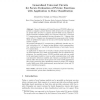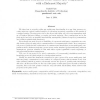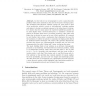25 search results - page 4 / 5 » Bounded-Concurrent Secure Two-Party Computation in a Constan... |
ICISC
2008
15 years 1 months ago
2008
Secure Evaluation of Private Functions (PF-SFE) allows two parties to compute a private function which is known by one party only on private data of both. It is known that PF-SFE c...
EUROCRYPT
2004
Springer
15 years 5 months ago
2004
Springer
We revisit the following open problem in information-theoretic cryptography: Does the communication complexity of unconditionally secure computation depend on the computational com...
STOC
2004
ACM
15 years 12 months ago
2004
ACM
We show how to securely realize any multi-party functionality in a way that preserves security under an a-priori bounded number of concurrent executions, regardless of the number ...
CRYPTO
2009
Springer
15 years 6 months ago
2009
Springer
The problem of carrying out cryptographic computations when the participating parties are rational in a game-theoretic sense has recently gained much attention. One problem that h...
CRYPTO
2000
Springer
15 years 3 months ago
2000
Springer
In this work we use cryptography to solve a game-theoretic problem which arises naturally in the area of two party strategic games. The standard game-theoretic solution concept for...



